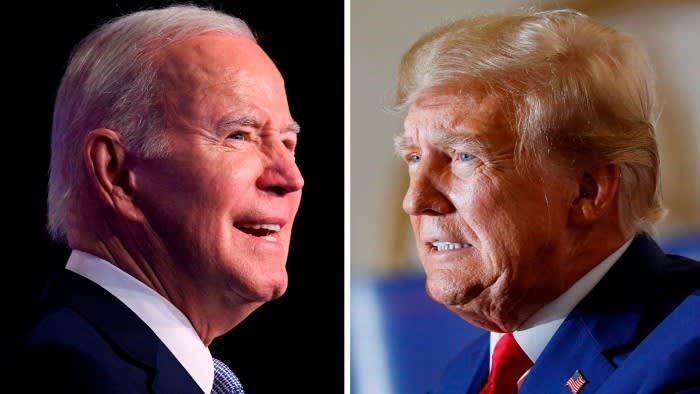Investors are already bracing for the US elections

Gain access to the Editor's Digest at no cost.
Every week, Roula Khalaf, the Editor of the Financial Times, chooses her preferred articles and features them in her newsletter.
With numerous elections taking place across the globe, the upcoming US elections set to take place in November are causing the greatest concern for market analysts.
If this were an average year for elections, investors would be observing the US presidential race at the moment without getting too involved, believing they still have plenty of time before it would impact their finances. Normally, most investors solely concentrate on the election result during the autumn in the US, which is just before citizens go to vote.
This year has been a bit different as investors are focusing more on the elections. This is due to the important nature of the elections and also because of how the race is shaping up.
The candidacies of Joe Biden and Donald Trump are shrouded in significant uncertainties. Biden is facing a great deal of scrutiny regarding his ability to serve another term. This has been exacerbated by a report from the US Department of Justice special counsel. On the other hand, Trump is confronted with a multitude of legal obstacles.
The markets have begun to take into account the possibility of a second showdown between Biden and Trump. This is noteworthy because it is the first time since 1892 that a previously defeated president has challenged the incumbent president who had previously defeated him.
Since Biden is currently in office and is expected to continue with his current policies, people are starting to focus on what changes might occur if Trump were to win. In 2016, the S&P 500 saw an increase of around 6% in the six weeks following Trump's win. Throughout his term, the S&P 500 saw a 57% gain, whereas it has only gained 48% under Biden so far. Barclays strategists have found that cyclical stocks, which are more sensitive to economic factors, performed better in the six months leading up to both the 2016 and 2020 elections.
If Trump were to be re-elected as President, it's difficult to predict his policies due to his unpredictable nature, although there are some hints that offer insight.
Vincent Mortier, the chief investment officer of Amundi, a European fund group, suggests that if Trump is elected, there could be various outcomes for different sectors of the economy. According to Mortier, in the short term, companies and industries such as defence could benefit from a Trump presidency. Additionally, Mortier claims that lower taxes could also be a positive impact of a Trump presidency.
Investors are concerned about a potential escalation of trade tensions with China, which is a significant area of worry. The recent sell-off in Chinese stocks was partly caused by a report from The Washington Post stating that Trump is considering various options for increasing trade tariffs and taking other measures against China, which is a major rival to the United States. This situation could have implications for other countries as well.
According to Xiao Cui, an economist at Pictet Wealth Management in the US, the policies of Trump that limit trade and immigration could be seen as having a greater possibility to cause inflation.
According to Citigroup, if the upcoming election in the US resulted in a win for Trump, it could negatively affect oil prices due to trade tensions causing a drop in demand. Additionally, if the relationship between the US and Saudi Arabia improves, Opec+ could increase the supply of oil. If negotiations between Russia and Ukraine were to successfully end, there could also be an increase in the supply of oil and gas. However, if Trump were re-elected, he may restrict the exporting of oil from Iran.
If Trump becomes victorious, another aspect that requires attention would be the US Federal Reserve. Recently, Trump reiterated that he would not renew Jay Powell's position as head of the bank.
On Wednesday, analysts at Morgan Stanley expressed their belief that the Federal Reserve's independence will continue, but cautioned that there is a possibility that the way they communicate could change and disagreements could increase. However, they stated that they find it difficult to envision a situation where the government's executive branch effectively dictates monetary policy.
When Trump and Biden compete in the election, the idea of limits could become important for investors. They are both only allowed to run for one more term and they also have to deal with limits on spending. Powell spoke about this recently and said that the US government's finances were not sustainable. The Congressional Budget Office predicted that the US deficit would increase by $900bn over the next 10 years, with most of the money going towards interest payments.
The Goldman strategists recently stated that a considerable change in the fiscal stance is more probable when one political party seizes control of Congress. However, they expect that the shift would be significantly lower in the year 2024 compared to what it was in 2020.
Despite everything, the primary recommendation for investors at the moment is to stay put. Many things have the potential to shift within the next nine months leading up to the elections.
Tom McLoughlin, who is in charge of monitoring the US election for UBS Global Wealth Management's chief investment office, recalls what happened in 1992 when George HW Bush was ahead of Bill Clinton by 22 points at this point in the election season, yet Clinton ended up winning. McLoughlin stresses the importance of adhering to an established plan and not getting too fixated on current events.









































